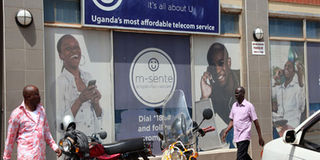Subscribers stranded as Uganda Telecom goes off air

A man pictured walking past UTL offices in Kampala. FILE PHOTO
What you need to know:
- Customers with UTL SIM (Subscriber Identity Module) cards have for about 72 hours now been unable to make or receive calls, which has irked the loyal base of clientele who are still entirely dependent on the services of the information and communication technology network company for mobile services.
Uganda Telecom (UTL) troubles are not about to end as it is currently experiencing a technical failure on the mobile service platform.
Customers with UTL SIM (Subscriber Identity Module) cards have for about 72 hours now been unable to make or receive calls, which has irked the loyal base of clientele who are still entirely dependent on the services of the information and communication technology network company for mobile services.
Some of the customers spoken to said despite being loyal to UTL, this development has stretched their patience to the limit, adding that they are now seriously weighing up their options.
Uganda Telecom, although owned by the government of Uganda, is currently under receivership due to huge debts. For the third day running, UTL remains non-committal as to when this problem will be rectified.
In a short statement issued today, the UTL management said: “We are currently experiencing a technical failure on our Mobile service platforms. Restoration updates will be communicated. Inconveniences caused are highly regretted.”
When contacted, the industry regulator, Uganda Communications Commission (UCC) Executive Director, Ms Irene Kaggwa Sewankambo, promised to get back on this matter later.
Since 2017 UTL has been under receivership and has not been adequately financed and as a result, it can’t keep up the tempo in terms of investment in new equipment (technology) and innovations, which has badly impacted the demand side of the business.
Before that, the problem of UTL and other Libyan investments in the country could be traced to the Arab Spring in 2010, which triggered sanctions from the UN, EU, and US on LAP Green, Libyan overseas investment arm.
So far only the UN and US lifted their sanctions, leaving the EU’s ban lingering on, hurting the operations of their investments.
The final nail in the coffin was the collapse of Col Muammar Gaddafi’s regime in 2011. This essentially marked the start of Lap Green’s problems after the UN Security Council slapped a freeze on its assets, with an investment portfolio of more than $66b that were in Geneva, Switzerland.
Libyan government which owned about 69 per cent shares of the company left in 2017 and the government assumed total responsibility for the company.
Since then, UTL has never been the same as it continues to grapple with huge debt estimated to be in a tune of about Shs700 billion ($200 million). The company continues to struggle with low cash inflows as the search for new investors remains futile.
Utility
The High Court in Kampala in 2019 appointed Ruth Sebatindira, the former president of the Uganda Law Society as the new administrator of Uganda Telecom Limited (UTL). She replaced Mr Nelson Twebaze Bemanya whose contract expired in November 2019.
Mr Bemanya, a registrar general of Uganda Registration Services Bureau (URSB), was appointed administrator of UTL following the exit of Ucom Limited, a Libyan firm that owned 69 per cent shares of the telecom.




